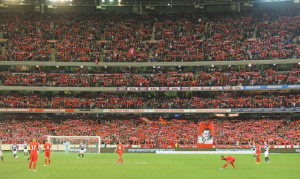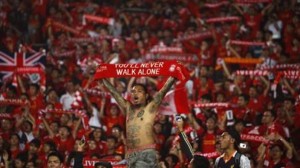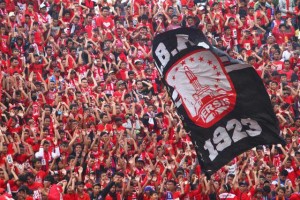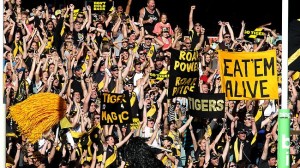At the Melbourne Victory – Liverpool match at the MCG in July 2013, some 90,000 sang the classic ballad, You’ll Never Walk Alone. This has become the anthem that unites Liverpool fans throughout the world. It is sung when the team enters the playing field and during games in order to heighten the intensity, the drama and to further encourage the players.
You’ll Never Walk Alone is also the song that is played in the lead up to running marathons in The Netherlands. As I waited at the start line in the Rotterdam marathon, I felt an odd sense of convergence: on that day Liverpool would play Manchester City, the winner seemingly to be in the primary position to win the League title. I was one of 10,000 or so: in my starting block there were mostly men, upwards of 30, dressed in the bare essentials of running gear. I imagined the different crowds of (mainly) men at Liverpool football matches, with fans holding aloft the red scarves: chanting the song in a stoic and reverent manner.
In the week leading up to the game against Melbourne Victory, Liverpool had also been in Jakarta to play against a composite team, known as the Indonesian All Stars. That there were still two main leagues of soccer in Indonesia made it difficult to form a single national team that could best represent the best of Indonesian soccer. But, the crowd, on this day at least, was just like the Melbourne crowd: they were the to see Liverpool. And so, packed into the Gelora BungKarno stadium, some 90,000 sang You’ll Never Walk Alone with a passion and exuberance equal to that of Anfield or Melbourne. The match was as dull as it would be in Melbourne: but, all could state that they had seen the Liverpool play.
But, Liverpool’s victory against Manchester City turned out to be a false sign of the eventual winner of the EPL. A disappointing loss to Chelsea, a shocking draw with Crystal Palace and the title became City’s with ease. City won the title through being consistent and not slipping up along the way. Liverpool played the exciting football and captured a enraptured audience throughout the world. And soon after the title became City’s, subscribers of Instagram were uploading videos directly from Anfield with the hashtag #ynwa.
The 15 second clips of footage were showing the Liverpool fans defiantly singing, chanting You’ll Never Walk Alone at the game’s beginning and conclusion: as if singing along could claim the title that seemed to be within Liverpool’s grasp. Suarez, of 31 goals, left the field with his face covered beneath his shirt, guided by Kolo Toure. He wasn’t walking alone, but this was a disappointing moment. He had given so much joy, hope and pleasure to Liverpool fans throughout the season, he should have looked them in the eyes – each 44,000 of them – and thanked them for their unwavering support.
***
Pasoepati, the supporter group of Persis Solo in Indonesia’s second division – the curiously named Divisi Utama (Main League) – have several main chants which they also churn out during important moments in the football game, but, also during the quiet moments of play when nothing much is happening on the field. The anthem for Persis Solo is Satu Jiwa, or, ‘One Soul’, by a group called The Working Class Symphony who play a kind of folk punk. Like You’ll Never Walk Alone, Satu Jiwa, also implores steadfastness in the face of changing and difficult circumstances: “kita tetap satu, apapun yang terjadi”, that is, “we’ll stay together, whatever happens.” Satu Jiwa greets the players as they walk onto the field, just as You’ll Never Walk Alone greets the players at Anfield. These two songs weren’t written for the clubs, but, they have been appropriated into becoming their anthems.
The Pasoepati supporter group state that their aim is to provide a vibrant and lively atmosphere throughout the full 90minutes of each match. One of the chants that is sung is “Alap-Alap Samber Nyawa”, “alap-alap” indicating a sense of threatening, “Samber Nyawa” being the name of a famous prince from Solo and thus indicating their identity. But, the chant of “alap-alap samber nyawa” wouldn’t be sung if it weren’t for its combination of vowel sounds; it almost rhymes, it’s easy to chant. The subsequent lyrics don’t make much sense, too, but no matter: “fly us into the galaxy, you will surely shake the legend, [we are] Persis Surakarto (the old name for the city of Solo)”. And in between there is a big oooooohh—–wwooohhhhh. The chant is sung to the beating of drums. One doesn’t need to be able to sing; one only needs a gut full of energy and a heart full of passion for the team.
***
But a footy game is not a soccer match. Footy grounds differ from soccer stadiums. Footy crowds contrast with those of soccer. A footy game is much longer and the action is more easily dispersed across a bigger playing field. Arguably, one needs more concentration to watch a footy game than a soccer game. Or, perhaps, it is a different kind of attention that is required. Soccer crowds in England or Indonesia are overwhelmingly male, the footy crowds of Australia are much more diverse: a roughly equal number of men and women and of course many children in attendance. The unified macho chanting of You’ll Never Walk Alone, Satu Jiwa, or Alap-alap Samber Nyawa might be not so easily created at a Richmond home game. But, part of me thinks it is possible, to a degree.
Do we have songs to sing at games? Is there a pop ballad that we could appropriate as our own song? A song that we all know the lyrics to, that we can chant during a quarter to rouse our team? Can we write a 4 line chant in homage of our great coach, Tommy Hafey, in the manner that Liverpool fans have songs for their captain Steven Gerrard? Can we have another four line chant in ode to Matthew Richardson who gave us so much pleasure during the long years of hopelessness? (We don’t have success at the moment, but at least we have a degree of hope.) Me thinks we have it in us as a supporter group to come up with songs and chants which can show our passion for our team. Regardless of how our team performs off the field, us fans can devise ways of making the experience of watching the Tiges play more and more enjoyable. Players, coaches, administrators come and go. For 10, 20, 30,40, 50, 60 years – or longer – the fans stay loyal. The fans maketh the club.



